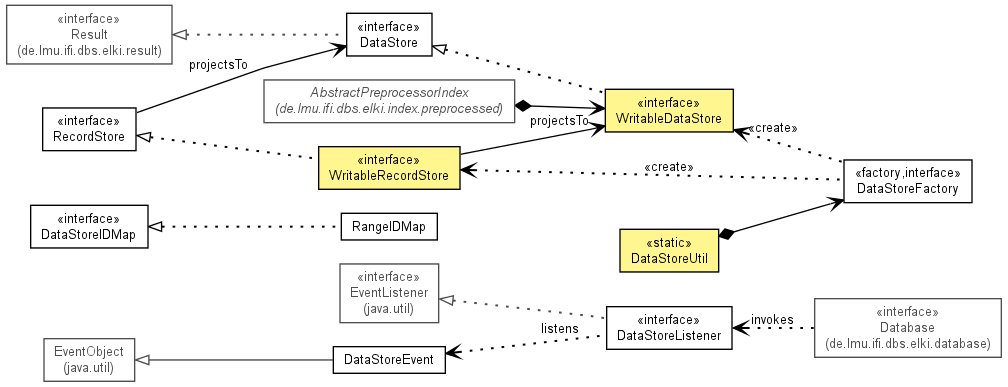| Overview | Package | Class | Use | Tree | Deprecated | Index | Help |

|

|
|||||||||
| PREV PACKAGE NEXT PACKAGE | FRAMES NO FRAMES | |||||||||
Map<DBID, T> - use everywhere!)
See:
Description

| Interface Summary | |
|---|---|
| DataStore<T> | Generic storage interface for objects indexed by DBID. |
| DataStoreFactory | API for a storage factory used for producing larger storage maps. |
| DataStoreIDMap | Interface to map DBIDs to integer record ids for use in storage. |
| DataStoreListener | Defines the interface for an object that listens to changes in a
DataStore. |
| RecordStore | Represents a storage which stores multiple values per object in a record fashion. |
| WritableDataStore<T> | Writable data store. |
| WritableRecordStore | Represents a storage which stores multiple values per object in a record fashion. |
| Class Summary | |
|---|---|
| DataStoreEvent | Encapsulates information describing changes, i.e. updates, insertions, and /
or deletions in a DataStore, and used to notify all subscribed
DataStoreListener of the change. |
| DataStoreUtil | Storage utility class. |
| RangeIDMap | Mapping a static DBID range to storage IDs. |
| Enum Summary | |
|---|---|
| DataStoreEvent.Type | Available event types. |
General data store layer API (along the lines of Map<DBID, T> - use everywhere!) for ELKI.
Every time you need to associate a larger number of objects (in form of
DBIDs) with any kind of value.
This can be temporary values such as KNN lists, but also result values such as
outlier scores.
Basically, DataStore<T> == Map<DBID, T>. But this API will allow extensions that
can do on-disk maps.
// Storage for the outlier score of each ID.
final WritableDataStore<Double> scores = DataStoreFactory.FACTORY.makeStorage(ids, DataStoreFactory.HINT_STATIC, Double.class);
|
|
|||||||||||
| PREV PACKAGE NEXT PACKAGE | FRAMES NO FRAMES | |||||||||||